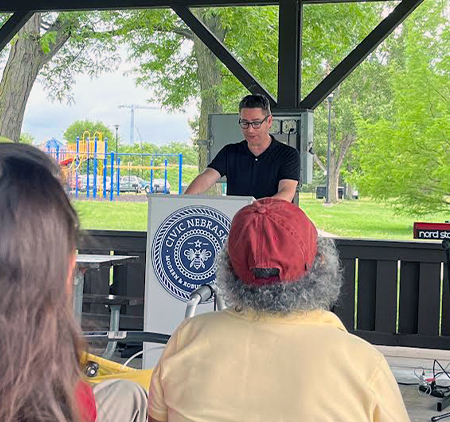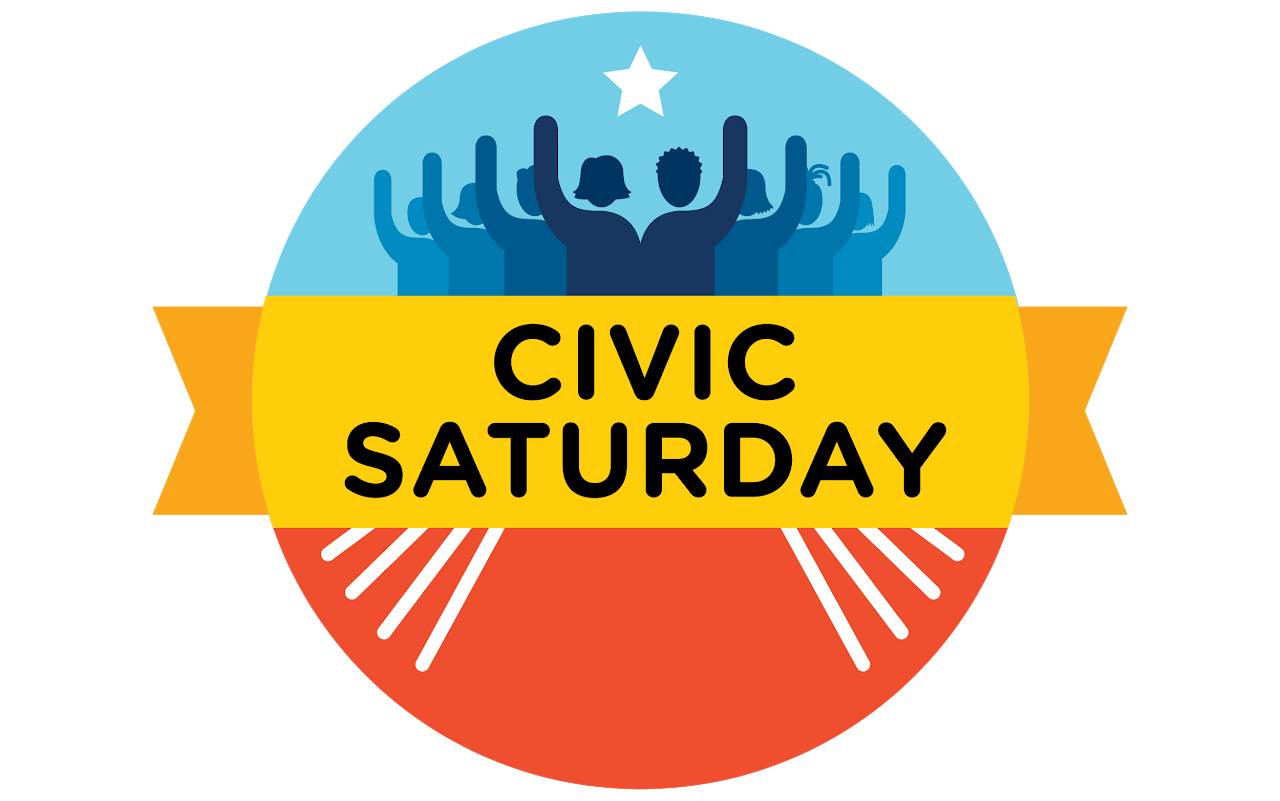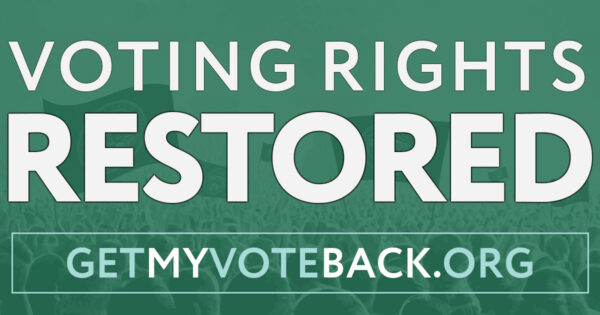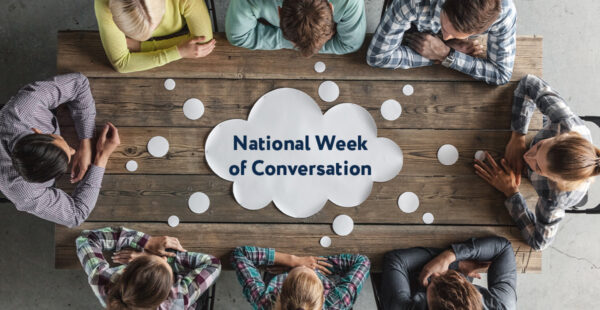On June 25, 2022, Civic Nebraska hosted its tenth Civic Saturday. The gathering featured music, original poetry, readings of civic scripture, and a “civic sermon” from Steve Smith, a national Civic Saturday Fellow from Lincoln. Hear audio of the entire June 25 gathering here, and learn more about Civic Saturdays here.

I am a tree-hugger. When I was in my 20s and early 30s, I lived out west and spent a lot of time in the Giant Sequoias and, later, the Redwoods. Decades on, we still visit them regularly, like old friends. In fact, a month ago, Kathy and I had the privilege of hiking deep into a grove of California Coast Redwoods during a long weekend in Sonoma County.
Being in the presence of such majestic life forms – hundreds of feet tall and thousands of years old – is quite the perspective check. Let’s put it this way. If you’re in need of an ego boost, don’t hike into a redwood forest.
 This time, though, it wasn’t their size and mass that struck me. It was their silence. At one point during our hike, Kathy and I just stopped and listened. We listened to nothing. And I mean literally no sound. It was absolutely quiet. Dare I say, absolute … peace.
This time, though, it wasn’t their size and mass that struck me. It was their silence. At one point during our hike, Kathy and I just stopped and listened. We listened to nothing. And I mean literally no sound. It was absolutely quiet. Dare I say, absolute … peace.
After a few minutes, I said: “What time is it?” And without missing a beat, Kathy smiled and said: “What time do you want it to be?”
That’s one of the things we say to each other when we find ourselves together in nature. It first started on a bike ride on the back roads of Zion National Park a decade ago. We say it when we’re lucky enough to be in a place where time doesn’t hold sway. Where there’s nothing on the agenda except to just … be.
That’s what walking in a wise old forest can do. It can bring the rushing river of modern life to a halt.
What time do you want it to be?
Eventually, we made our way back to our vehicle, and before long we were on the road to civilization. The car radio cycled through the day’s headlines … a mass murder at a school in Texas, the ongoing war in Ukraine, the toxic primaries in Georgia, a leaked ruling from the Supreme Court – a ruling that, as we all know, has now come to pass.
We turned the station, trying to retrieve that vibe from just a few minutes earlier. But it was too late. Time was moving again: War. Violence. Inequality. Injustice. All of them, speeding around us, encircling us.
I realized that the “absolute peace” I’d felt back at the grove wasn’t peace at all. I mean, sure – it was peaceful in a physical sense, but it wasn’t peace.
A wise man once said that true peace isn’t the absence of tension. It’s the presence of justice. For many of us, no doubt, it feels like justice is in extremely short supply these days. So maybe today is a good day to talk about it.
We could spend hours – days – debating what is just and unjust in this modern world. So while preparing for today, I figured I should narrow the scope a bit. That was a fool’s errand. No matter how I sliced it, I came to the inevitable conclusion that you can’t atomize this topic. Everything matters. Reproductive justice is on everyone’s mind today, but that’s tied to social justice, which is tied to racial justice, housing justice, and environmental justice … the list is long, almost endless. Everything is connected. I know this. You know this. I won’t belabor the point.
At some point, while I was pondering all this, though, I came across a phrase. It goes like this:
If justice is realized, then truth is vindicated – and peace is the result.
I feel this phrase today, friends. I feel the labor in those words. The action and sacrifice and perseverance. Justice doesn’t exist in the abstract; it’s a hard-won agreement among fellow-citizens. As such, it’s not static, and as we have seen, it is certainly never guaranteed.
What can we do, starting today, as citizens to ensure a more just America? First, let’s talk about living justly. Then, let’s talk about vindicating the truth. And finally – let’s look at that path toward peace.
Working for justice sounds straightforward.
But the world can be a random, complex, difficult place. Folks, we are busy and under pressure and sometimes we don’t get it right. Still, despite it all, most of us still want to be good people – good Americans. If asked, we will certainly say that yes, we support housing justice, and racial justice, and environmental justice, and so on.
Then comes the rub. When it comes time to advocate for those things, truly advocate for them, well, that’s when things can get muddled, can’t they? The problems are so immovable, so entrenched, so multi-layered – too damned big for one person. So we resolve to start merely by doing no harm. Let’s just not be part of the problem, you know?
Maybe let’s start by just being nice.
There’s a big difference between goodwill and being good. The summer of 2020 taught us that, didn’t it? I mean, if being nice was all that it took to bring racial justice to America, we would have accomplished that long ago.
We Americans tend to be good at supporting a cause when the lines are bright and the injustice is plain and simple. When the victim and the offender are clearly identified, and our American sensibility of fairness has been activated, or re-activated after a long slumber. We change our profile pictures, we share posts. Some of us even leave the house to march and chant and rally.
But eventually, there are no more marches or rallies to attend. There are no more hashtags to get trending. All that’s left is the grudging, grinding, day-by-day work of making change. Work that requires us to tackle – person by person, case by case, situation by situation – the underlying injustices that led to all the fury in the first place.
An awful lot of us – and I include myself in this group – sense what is really necessary for the pursuit of justice, and we tend to find ourselves suddenly awash in pragmatism. It keeps us on the sidelines. Or at the very least, a safe distance away.
Hey look, that arc of history is really long; I’ll cut it loose for a while, maybe check on it later, see if it’s bending towards justice. But in the meantime, I’ll be nice.
And make no mistake. While we’re busy being nice, the vacuum IS being filled. With venom, half-truths, and full-on lies, all designed to inflame us and divide us and reduce us to our caricatures. The people behind these tactics have a vision of America engulfed in domestic enemies, rigged elections, and invaders at the border.
This is populism’s dark side: Americans who are suspicious of everything, distrustful of everyone, and hostile to anyone who doesn’t share their paranoid views. While we’re busy on our screens overthinking and underperforming, they’re growing.
But yet? So are the truth-tellers.
There is no justice without truth. Despite all the news this week, I have great optimism about where our nation is trending. If you know where to look, it’s clear that many Americans have found their voices in recent years. And they are using them to pursue just causes. From the tireless street-level advocates in our city going to the City Council next week in pursuit of fair housing; to the Americans testifying at the hearings about the January 6 insurrection. This takes resolve, bravery, and a powerful sense of clarity and right. All I can do is offer a deep bow to such day-in and day-out courage.
One thing we can do today is bear witness and learn from these partisans for truth – about how they speak up and stand out. About how they call out public lying in all of its forms. And about how they don’t just “go along to get along.” All of us have found ourselves in that position, for whatever reason. It’s awkward, it’s uncomfortable, and it might even be dangerous at times to speak up. It’s easier to be nice, easier to be polite.
What time do we want it to be?
If we choose, it can be time for radical truth. A time for a common understanding, a realpolitik that can bring about meaningful change.
What’s the alternative? History is full of bad things happening when good people choose to just be nice. Being good, though, means we have to summon the courage to tell the truth. About the times we live in. About who we all are. Relentlessly.
That’s how we vindicate truth. And how we pursue justice. And, perhaps, that’s how we find our way toward peace.
We gather today with the Supreme Court looming large.
This is the time of year when the Court issues orders that supposedly bring peace to our deepest, most difficult political arguments. We await these last-and-very-final words with bated breath: Will I approve of how our appointed Constitutional prophets determine our collective fates? What fundamental new reality will they impose upon us today? Regarding guns? Regarding the climate? Regarding voting rights? Regarding our personal right to privacy?
If you think about it too much, like sometimes I do, it can feel like everything we’ve talked about so far today doesn’t mean a thing. What good, really, is living justly and practicing civic virtue, if the High Court can just reset our shared reality if they’ve got the votes? Why fight for truth, if our national narrative can be retconned? Why bother working for peace if it can just be wiped away, like so much chalk dust?
The answer is simple, and it’s complicated. And it lies within each of us. All of us – all of us – possess moral autonomy. We have the self-governing power to decide for ourselves what is right, and what is good, and then to act accordingly. This is what makes us human, makes us individuals and gives us value. No law can take this away from us.
The only way we can lose it is if we become so complacent or resigned or cynical that we give up and decide to accept a world that is unjust. That’s the absence of tension, but that’s not peace.
I look out at those of us assembled here, and I see many good Nebraskans – everyday people who have become unexpected activists over the past six or seven years. Together, you’ve witnessed the resurgence of intolerance, untruth, and injustice – but instead of retreating, you summoned the courage to fight.
You’re examples of how to put your moral autonomy to work. It’s guided you toward what is right in a world where it feels like so much is wrong. Instead of shallow political hobbyism, you’ve taken on the deeper work of connection that a modern democracy requires.
You’ve met fellow travelers. You’ve held space for one another, brought new people into the fold, and seen the fruits of your labor grow. This is civic power. It compounds. It expands. It seeks out others. It makes strangers into compatriots, and compatriots into friends.
Networks form – and then, networks upon networks upon networks. Together, you’ve all imagined a world that’s a little more just, and you’ve committed your whole selves to making that vision a reality.
In big ways, and in small ways, there is peace in this process. There is. If we choose it.
What time do we want it to be?
What if we said it was time to quit relying each June on nine unelected judges to tell us what is truly best for a socially, culturally, geographically, and politically diverse republic that is 350 million strong?
What if we said it was time for us all to claw back the final authority in our democracy?
No, we can’t immediately stop the Supreme Court from issuing wrongheaded decisions. All we can do, right here and right now, is decide how to react and respond to them. And to that point, I encourage us all to remember our individual – and collective – power as Americans. That is the real strength of our Republic.
It’s happened before and can happen again. No sooner did the Dred Scott decision come down, and activists, lawyers, lower-court judges, and everyday citizens began working to undermine, undercut, resist and, ultimately, overturn it. Those Americans showed us that the Supreme Court’s power, when met by the power of a just and moral people, is limited.
So it’s time to summon that power once more. Show up. Join. Serve. Advocate for others. Claim and spread your civic power. Get mad if you have to – trust me, there is time for outrage. But we can’t stay outraged forever. Shaming and revenge do not amount to justice, and there is a delicate balance between what comes from righteous anger and the humble, steady, lifelong work that we are now called upon to do.
And there is peace in this work. Peace in the knowledge of leaving nice behind. Peace in doing good.
The serenity of that redwood forest seems far away now – but it’s still within reach. We can learn a lot from those old giants. After all, they’ve been counseling together in community for more than 2,000 years. They have lessons that we can carry in the days and years and decades to come.
Stand firm.
Rise up.
Go out on a limb.
Don’t forget to breathe.
And remember: We are all part of something far greater than ourselves – an ageless system of community and growth and progress that goes back to the very beginning.
We’re outside the peace and protection of the grove now. Time is moving forward again.
What time do we want it to be?
Thank you.




